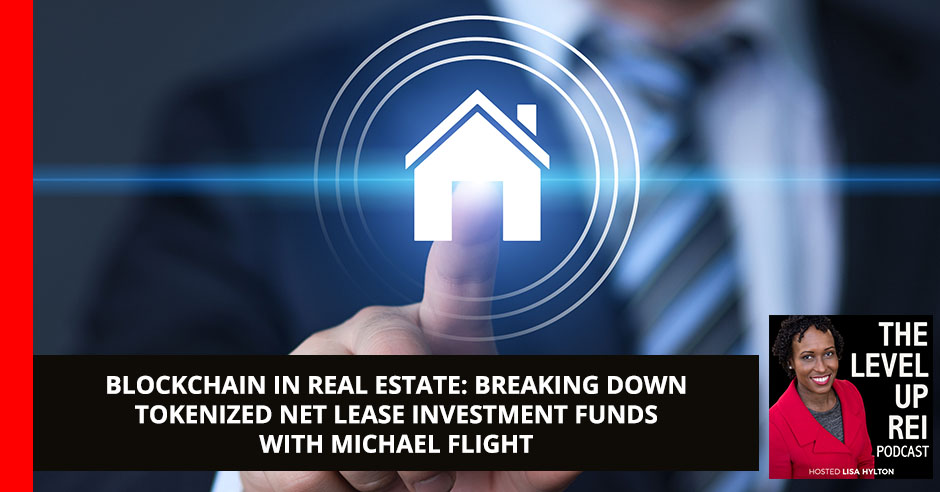
We can’t deny the fact that technology is constantly evolving. So how can this affect our nature of business and even our daily lives? In today’s episode, we have Michael Flight to discuss the difference of venturing into real estate today using current technology such as blockchain and tokens compared to traditional real estate investments. He is a founding principal of Concordia Realty Corporation, CEO of Liberty Real Estate Fund, and a blockchain real estate evangelist specializing in retail real estate. Taking advantage of this technology and coping up with the latest trend could bring you massive gains. Listen and find out more!
—
Watch the episode here
Listen to the podcast here
Blockchain In Real Estate: Breaking Down Tokenized Net Lease Investment Funds With Michael Flight
I’m super excited to have on the show Michael Flight. He is a real estate entrepreneur. He was a Founding Principal of Concordia Realty Corporation in 1990 and the CEO of Liberty Real Estate Fund. The world’s first net lease security token fund, giving you stable and tradable private real estate. Michael is a blockchain real estate evangelist who is an expert in retail real estate both triple net shopping centers, triple net lease investments, redevelopment, real estate tokenization, and real estate on the blockchain.
He started his commercial real estate career in 1985. He has an extensive record of partnering with some of the world’s most well-known banks, insurance companies, hedge funds, and institutional investors in many successful projects. Michael, I’m super excited to have you on the show. Thank you for being here. I appreciate it.
Thank you for inviting me. It was a pleasure to meet you in person and it’s even better to see you again. I love talking about real estate and how blockchain can change real estate.
The show is broken out into three parts. The first bit is a little bit of background about yourself, then we are going to jump into the meat of the episode talking about net lease and blockchain, and then close things down with the level of questions. To get started, where in the United States do you live?
I’m in Illinois, most particularly Cook County, Illinois. I keep saying that I need to leave here but right now, I’ve got family and everything else that I need to take care of but at some point, I will try to get out of Illinois, especially when winter is coming. I would much rather be in California like you, except the political system there is messed up, too.
What do you and your family like to do for fun?
My two boys are grown now. My oldest is working for Nevin as a real estate analyst in Boston. My youngest is a senior at the University of Illinois. My wife and I still love traveling. I have taken my kids to 45 different states and in a few different countries. I love to travel, experience people, meet people, and one of my favorite hobbies is going to real estate conferences.
The last question in this section is a good friend of mine and yours as well tells me that your favorite restaurant in Vegas is the Peppermill and I’m asking, “How did this come to be?”
It’s not necessarily my favorite restaurant in Vegas. It’s just a restaurant that he and I happened to go into but Adam Carswell has worked with me and for me since 2018, 2019. He’s a great guy and a super good friend. We are also residents of a startup country called Libraland.
Meet people. That’s how you continue to grow and learn. Share on XI know there are so many good things that we could get into but I’m going to go ahead and get into the show itself on the net lease. To set the stage, can you talk a little bit about the types of properties that you like to do triple net leases on?
I started in a shopping center. In about 1986, I started as a commercial real estate broker and decided to specialize in retail real estate. The great thing about retail real estate is you can do some deals with tenants. I primarily started out doing leasing with tenants. The leases are long-term leases. If you get a relationship with a retailer or the person that does the real estate for the retailer, you can do some deals. In the Chicago market, retailers are expanding here. There are about five million people in the Chicago market. Some retailers could potentially put up to 40 stores in this market but we do retail real estate throughout the country.
I started seeing that the internet was disintermediating retail. We started trying to put together a strategy like, “What retailers are going to survive? What retailers can’t go onto the internet?” We put together a model portfolio with some retailers like medical retail, DaVita Dialysis, Your Dentist, Your doc in the boxes, and we did auto services. Now, drug stores are doing phenomenal sales.
We believe that they are going to be around because they’ve got the drive-thru component and do a lot more. They are not only drug stores and healthcare but there are also convenience food stores, too. We liked dollar stores. We believe they are going to be around for a bit because they meet a need for people that need to go out and get things right away.
Grocery stores don’t go completely online and I have a lot of people say, “Amazon does grocery.” I could also point to Amazon owning Whole Foods and now they are expanding with Amazon fresh markets, which is a scaled-down but not necessarily as high end is. They are probably going to open up at least 500 of those stores over the next 2 or 3 years. There are a lot of things that Amazon and most retailers have figured out that you can’t.
The other industry trend is a lot of retailers are moving out of malls and shopping centers and doing single-tenant buildings because it gives them a lot better brand value, more convenience, and they have more control over their property. With those factors, we have moved into buying more aggressively single tenant net lease properties. We still do shopping centers. It’s not our primary focus but if we saw a good value add shopping center, we would do that as well.
For people who are reading who don’t even know what a net lease or triple net lease is, could you touch on that like what that is exactly?
Triple net leases are the tenant pays for the taxes, which is one net. The tenant pays for the insurance, which is the second net and the tenant pays for the maintenance of the building. For example, the easiest thing everybody sees is an individual Starbucks, McDonald’s or Walgreens out there, those tenants not only pay all the real estate taxes on the property but they also have to pay for the liability and the property insurance for the building. They pay to maintain the building. If the roof goes out, they replace the roof. If the HVAC, which is the air conditioning system goes out, they replace all of that. That’s what a true triple net lease is and you can remember triple net lease by the acronym TIM as Taxes, Insurance and Maintenance.

Blockchain Real Estate: The other industry trend is a lot of retailers are moving out of malls and moving out of shopping centers, in doing single tenant buildings because it gives them a lot better brand value.
When I hear that, I’m like, “Wow.” That alone makes it compelling to me as to why it would be potentially a good investment. One of the biggest things when even thinking about investing in multifamily is when we are doing underwriting that you have to be thinking about the taxes. If you are in a particular state, they could increase the taxes next year and stuff like that, insurance being another one. I’m curious for you, what has made this space so compelling that you have spent a large portion of your real estate career in it?
The simple answer is it’s the only thing I know how to do but that’s not necessarily true. We have invested in apartment buildings, and fix and flips in portfolios in the past, we have done a lot of different things but the retail real estate business is what I know. It’s where I have most of my contacts. I have relationships with retailers that they come to me and say, “We want to be here. We’ve got a problem landlord here. Can you help us out? See if you can acquire this property, then we can work in and we would put some money into it.” That’s particularly why I like it. I also like it because these leases I described as bonds wrapped in real estate.
They are long-term leases with large corporations. You don’t have to go knock on the door every month and say, “It’s the tenth of the month. We didn’t get your rent.” One of the other things is you are not going to see wild swings in upside or downside either unless the tenant goes into bankruptcy. For example, value add multifamily, you are buying it and it might be a particularly low cap rate but you say, “I’m going to increase the income.” The income typically increases on a lot of leases every five years. The reason why we like medical and automotive tenants is a lot of the leases increase in escalate a few percent every year or every other year.
I like them because they are long-term leases and a large majority of the corporate tenants. They don’t even write you a check. They send the money directly to your bank account as an ACH payment and I like it because it’s a business real estate. When I have done apartments in the past, you end up working on the weekends and things like that. I don’t mind working on the weekends but I don’t want to be at a property dealing with problems on the weekends.
If the tenant has a problem with their toilets and they call us, we say, “If you are reading your lease, you know you need to get a contractor. Here are a few that you can call. We don’t handle that.” That’s the nice thing about the triple net. It’s the nice thing about the retail business because with industrial triple net, office triple net or other triple nets, a lot of times, you can’t do multiple deals with the tenant versus with a retail triple net. You are providing them capital so they can expand their footprint and get more sales.
When you say that, that reminds me of the sale lease buyback. Would that fall into that area or not?
You can do a sale-leaseback. Sometimes the tenant does own their property but most retailers do not own it. For example, Starbucks doesn’t own any real estate. 7-Eleven has 40,000 stores worldwide, and they don’t own any real estate. Where you see a lot of sale-leasebacks is where a tenant is an industrial tenant and they have a plant.
I know guys that have bought tractor dealers and it has probably five locations. That’s where you see a lot more sale-leaseback but you do see some sale-leasebacks. McDonald’s Corporation was getting punished on their stock for a while because people said, “You’ve got all this real estate sitting on your books. You should spin this off into a read or do some other things.”
Some tenants still own it and would like to get out of those, so you can potentially do a sale-leaseback but for the most part, most of our stuff is already built, ground up and we are acquiring it already seasoned deal or we will do a what’s called a bankable takeout. We will do a contract with the developer that’s developing the property and say, “You can go to your bank and borrow money off of this because you know that we are going to buy it as soon as you finish the project.”
The retail real estate business is where you can have most of your contacts. You could meet a lot of great people. Share on XOne other thing, I feel that a lot of investors retail has gotten a bad rap in this time of COVID. You have said retail so many different times that I’m sure people reading are probably like, “Wow.” Their mind hasn’t come around the idea of it. I’m curious about the trends that you are seeing taking place in the triple net lease space retail real estate and how it’s affecting the asset class, given that you are still in it and doing well?
We had some real problems in 2020 in some of our shopping centers because the states in certain areas, especially in Illinois and some of the Northern States, closed down businesses randomly. We had some real issues. Our management company and some of our assets took a large hit on cashflow. The thing that we were trying to design with Liberty Real Estate Fund was that it would be an internet-resistant real estate fund. It wouldn’t be affected by the internet and that also proved to be pandemic resistant.
The tenants that we are investing in our word declared, for the most part, essential business tenants and I can say across the portfolio, none of them stopped paying rent versus in some of our shopping centers. The Marshals, the Ross’s, and some of the other clothing tenants, and some of those tenants were deemed non-essential. They were closed for a period. We ended up having to work out.
We have a good relationship with LongHorn Steakhouse and they said, “They are killing us because we don’t have a drive-thru.” They ended up doing takeout and takeaway. They are still doing that and now it’s a part of their business but we had to work out or reduce rent for them. I’m talking to my partners and I said, “We can either reduce the rent, give these people some free rent or they can completely go out of business, and then who you are going to get to replace them?” That was the position. A lot of the tenants, we gave them a rent holiday. They are paying it off now over the next 1 or 2 years.
One other question is on occupancy rates over the past few decades in the triple net lease asset space. Can you talk a little bit about that aspect of the business?
The greatest thing about triple net leases is their long-term leases. We have done leases with Walgreens that are 50-year leases. These things just click on and off, cut click all the way through. What the market is doing is you’ve got a rent that’s guaranteed by that corporation. As long as the corporation is doing well, the first thing that they pay is the rent.
Even if the corporation goes into bankruptcy, by Bankruptcy Law, they have to pay the rent first, then the bondholders, and then if there is any equity left. The great thing about triple net leases is they have had the highest occupancy of any real estate assets since they started keeping track of triple net around in the mid-1980s. It’s just their occupancy is fluctuated between 97.5% on the low side up to 98% close to 99% occupied.
I wanted to pivot now a little bit into blockchain technology and the world’s first fund that you have is pretty amazing. For people who are reading, who don’t know what blockchain is because I still think there are many people out there that don’t, can you first share a little bit on what is blockchain technology, to begin with?

Blockchain Real Estate: No matter what the market is doing, you’ve got a rent that’s guaranteed by that corporation. So as long as the corporation is doing well, the first thing that they pay is the rent.
Most people associate blockchain with Bitcoin and cryptocurrencies. Bitcoin and cryptocurrencies do run on the blockchain. What I like to try and explain is just like the internet changed communication, so that now through email and Zoom, you can do instantaneous communication anywhere in the world. Blockchain is the same thing but you can transfer money, assets or value anywhere in the world instantaneously.
Blockchain is going to be the retails of the new financial system. For example, if I had to send you money to the Cayman Islands like I’ve got people that work for me in different countries now, I can send them money blocked through PayPal or some of these other things but you have to pay expensive transfer fees. Whereas if I pay them in a USDC Stablecoin, Bitcoin or Bitcoin Cash, I say, “I’m going to send you $100, Lisa.” All I’ve got to do is press send. If I know your wallet, it’s instantaneously. Within Bitcoin, it’s probably the final confirmation will go through in ten minutes but that’s still a lot faster than if I had to send you a bank wire to the Cayman Islands, it wouldn’t be confirmed for seven days.
The great thing about blockchain is its instantaneous transfer of value anywhere in the world. The other cool thing is if you have your money in US dollars and a bank account, that money is in the bank. If you own your Bitcoin, USDC Stablecoin, Ethereum and you have it in your own wallet, then you control your assets. You can go back to the Cayman Islands, I could move to Costa Rica, Dubai or Romania and my assets are outside the banking system. I’m not dependent on trying to get my money out of a bank in America or someplace. That’s what blockchain is.
From your perspective, how will blockchain technology make real estate more tradable and accessible?
We were saying that not only is the blockchain good at transferring value but it’s good at tracking value. For example, you could invest in our fund and once you get your tokens, those tokens will be shared. It was like normal syndication, except that your shares are now tokens. Those tokens show up on the public blockchain and it doesn’t necessarily say who you are but you can point to that blockchain and say, “I own this.” In normal syndication, somebody’s got your shares and the capitalization table of all the equity holders either on a spreadsheet or in a file cabinet. I’m old enough that we used to use file cabinets.
I’m saying that 1) There are a lot more transparencies and, 2) You can take your distributions as an ACH payment directly into your bank account, where you can take your distribution as an Ethereum, USDC Stablecoin or a Euro Stablecoin. You can dollar cost average out of the dollar with the monthly cashflow from our fund. That’s another great thing about it.
It’s good for syndicators because syndicators can also keep track of who the shares are and everything else. Our fund is a 506(c) fund so it’s for accredited investors but the great thing and this is approved by the SEC and this is a rule that they put out that after a one-year lockup period of the original accredited investor owning that, that can also then trade to non-accredited investors. It opens up some nice real estate opportunities. If somebody was investing with you, you have the potential that you might get some people that couldn’t ordinarily get into your first round. They could get into it and enjoy the experience of passive cashflow from multifamily apartments.
I think one of the things too, is if, in this scenario, people can probably sell some of their tokens to someone else like, “Cashout?”
One of the things that have impacted me is when my father passed away in 1986 when I graduated from college. A year or two before he invested in a real estate syndication, it was a hotel. Up until 2020, my mother could not get out of that deal. She was locked in that deal. They never returned any of the capital tours. Only sporadically did she get small payments. She has never got the equity back that my father invested in it.
Greatest thing about triple net leases is their long-term leases. Share on XFinally, during COVID, the hotel went into foreclosure and bankruptcy, and then they ended up giving the property back. At the end of this whole 35-year ordeal, she ended up owing taxes on phantom income because they gave back the property and there was loan forgiveness. To make a long story short, with the security tokens, you have the option that you, as an investor, can trade your token.
I could go to Lisa and say, “Lisa, I’ve got $50,000 worth of tokens and it’s kicking off X amount of cashflow. If you are interested, I will sell you these tokens and you can get into this investment. We could go peer to peer. There’s no broker involved. It’s just me and you.” That’s what I’m talking about. The blockchain allows you to control your assets.
You could list them on an exchange or an automatic trading system, which is a step down from an exchange or you could get a broker to sell your shares. The other cool thing is that, if you liked that investment and want to stay in that investment, there’s the potential to deposit those shares in a company like BlockFi, Nexo and these companies are what they call decentralized finance companies. You could deposit those and if they are comfortable with the net asset value of those shares, you could borrow against those shares and not even have to sell shares.
That’s why I’m excited about the opportunities. I like to say this all the time. Since 1990, billions of people have come out of poverty and moved into the middle class worldwide. I would try and steer them away from investing in the New York Stock Exchange or some of these other things they can invest on Wall Street. At some point, there’s going to be worldwide commercial real estate assets, where they can get even down to a $10 increment.
I want to buy a piece of a London office building or something and they are going to get equity in a good commercial real estate. That’s going to be an asset that they can use. Let’s say they want to start a store, farm or they need something, they can borrow against that asset where they might not even be able to pay for a whole house.
It is something that limited partners and realistic syndications now don’t have that current ability to do.
This technology can transform everybody’s financial wherewithal. Those people that have moved in the middle of class are going to need to find a place to create wealth. You are in the business of helping people not only create wealth, passive income and generational wealth. These security tokens are going to further enhance that and make it more widely available to a lot more people.
I want to wrap up here with a final question before I get into the level-up questions. Reflecting back on your journey, you have been in this space for many years. Could you share what you have learned from investing over the past four economic downturns and into this current pandemic, “Downturn to now upturn?”
I would say that every downturn is different and there are new challenges to every downturn. The saying is, “History doesn’t necessarily repeat but it rhymes.” With those downturns, you learn different things. For example, when the pandemic started happening, we knew that tenants weren’t going to be paying rent. We knew that lenders get antsy when a lot of your tenants don’t pay rent.

Blockchain Real Estate: Every downturn is different and there’s new challenges to every downturn.
The first thing we did was contact all our lenders immediately before the tenants stop paying rent. We knew that if the tenants were going to be shut down, we could have some issues. We’ve got ahead with the lenders and said, “Before things are going, we just want you to know that we might have to do some lease modifications and we need you to work with us. Otherwise, it’s going to get ugly for both you, us and the tenants.” That’s one of the things that we learned.
The other thing I have learned and what I tell potential partners is I haven’t had everything bad happen to me but I had so many bad things happen because no deal ever goes directly this way. You can describe a deal and your life as you are going up. You could have a corkscrew, you go back down around, and then you go up.
As long as you keep going up, you make it over that next hump and keep going that way, you know there’s a light out. I haven’t had everything bad go wrong but I know that you shouldn’t quit. If we can’t figure it out, I have a wide network of people that can help me figure it out. Everybody else, if your network can’t help you figure it out, you better start looking for some people in your network to expand.
This now leads me to the level-up questions that I ask all my guests. The first one is, what are you grateful for in your life now?
I’m grateful for everything. I could go on for about an hour as to how grateful things are.
What has attributed to your success and continuous growth?
I would say I’m not giving up. There have been some difficult times in my life when I started in commercial real estate. In the evening, since you don’t make any money as a broker until you close a deal, I would deliver Domino’s Pizzas. When we started our company in 1990 in the middle of a very severe recession, in the International Council of Shopping Centers, there’s a big convention every year in Las Vegas.
The phrase that year was stay alive until ‘95 that was in 1990. My partner and I would get up early in the morning and deliver newspapers to newspaper boxes and stuff. They don’t have newspapers anymore, so I’m dating myself but there are hard things, continually learn and learn from your mistakes because there are going to be mistaken. If you don’t have mistakes, that’s great but I think you get stronger moving through adversity.
Last but not the least, what do you now know that you wish you knew at the beginning of your journey?
Blockchain is going to be the sales of the new financial system. Share on XI know that they invented the internet and at the time I started my journey, there weren’t even cell phones. It was not big of a thing but I now know that the connections and the people you meet, and a lot of people like to hang out on Zoom meetings, Facebook and stuff. I can’t say enough about meeting people in person. I still have a mentor to this day that I met as a senior in college.
I have had some long-term relationships. My attorney has been my attorney probably since about 1995. He saved me a ton of money because my older son was a runner and he was interested in going into soccer or running. He said, “Have him go into running because he’s got a chance of getting a scholarship, either through cross-country and track.” It saved me $260,000 because he got a scholarship to the school. That was the best advice my attorney ever gave me.
If my audiences want to learn more about you, where’s the best place they can go to learn more?
If they want to learn more about blockchain real estate and triple net real estate, they should go to LibertyFund.io. We have a lot of great articles not only triple net real estate and how to do net lease investing but we also have some articles on blockchain real estate. We also have The Blockchain Real Estate Summit, in which we are putting more information up there. There will be a lot more articles up there for people looking to either figure out how blockchain and real estate fit together and also if you are a syndicator, how they could start to do syndications and eventually get into security token syndications.
It’s revolutionary, I love it. Thank you so much for coming on.
Just do like you did and go to The Blockchain Real Estate Summit in 2022 and you will be drinking from a fire hose but was it good for you? Did you learn much?
It was. I was exposed. I learned so many things about blockchain and real estate. It had never crossed my radar. People are doing many tokenizing hotels to funds like what you have going on. I would not have known this if I hadn’t taken the time to go to Austin and through that relationship now having you on my show and being able to share this message to even more people who probably didn’t even know that it was possible as well. I am getting it out there. Thank you so much for coming on.
—
I’m going to check two places, one the Q&A. The question that Ryan has is, “How can the everyday person get involved and participate now in blockchain transactions?” Do you want to go ahead and take that one?
It depends. If you are talking about cryptocurrency, I would suggest starting and buying some Bitcoin. If you are familiar with how to buy cryptocurrency, owning your own assets, and things like that, you can do that through any of the exchanges like Coinbase or Kraken. I would also recommend there are cryptocurrency meetups and a few different things like that. There’s a good YouTube called Coin Bureau. The guy’s name is Guy.

Blockchain Real Estate: History doesn’t necessarily repeat, but it rhymes.
If you are looking to get into blockchain real estate and you are a syndicator now, what I would suggest is to find a securities attorney that knows how to write the additional stuff you need in your syndications. If you put in your syndication in the future, you have the right to do a tradable asset and issue it as a digital asset on a blockchain, that will have you covered. You can do your syndications now as normal, and then continue to learn more about, whether this is a technology that you want to but at least you’ve got all your syndications ready that you are doing now.
That’s the one thing I would change and then go in and learn like I said, “There are different meetups.” We had the Chicago Blockchain Real Estate Collective, which we have now renamed the Blockchain Real Estate Meetup. We are going to have more of those meetups so that you can see some of the people that are doing things, what they are doing in their area and all the rest of it.
That’s all the questions that I had. We cleared everything. I don’t see any other questions and we are good to go. Thank you so much, Michael, for coming on and I hope everyone enjoyed it.
I appreciate you inviting me, Lisa. Let’s stay in touch. Are you in the Los Angeles area?
I am in the LA area.
Thank you very much.
You are welcome.
Important Links:
- Concordia Realty Corporation
- Liberty Real Estate Fund
- BlockFi
- Nexo
- The Blockchain Real Estate Summit
- Coinbase
- Kraken
- Coin Bureau – YouTube
- Blockchain Real Estate Meetup
About Michael Flight
 Michael Flight is a founding principal of Concordia Realty Corporation in 1990 and more recently CEO of Liberty Real Estate Fund, the World’s First Net Lease Security Token FundTM giving you Stable and Tradable Private Real Estate. Michael is a real estate entrepreneur and Blockchain Real Estate evangelist who is an expert in retail real estate (NNN-Shopping Centers-Triple Net-Net Leased) investment, redevelopment, real estate tokenization and real estate on the blockchain. He started his commercial real estate career in 1985 and has an extensive record of partnering with some of the world’s most well-known banks, insurance companies, hedge funds and institutional investors in many successful projects.
Michael Flight is a founding principal of Concordia Realty Corporation in 1990 and more recently CEO of Liberty Real Estate Fund, the World’s First Net Lease Security Token FundTM giving you Stable and Tradable Private Real Estate. Michael is a real estate entrepreneur and Blockchain Real Estate evangelist who is an expert in retail real estate (NNN-Shopping Centers-Triple Net-Net Leased) investment, redevelopment, real estate tokenization and real estate on the blockchain. He started his commercial real estate career in 1985 and has an extensive record of partnering with some of the world’s most well-known banks, insurance companies, hedge funds and institutional investors in many successful projects.
Michael has been featured on CNBC Arabia, CEO Magazine and quoted in Yahoo Finance, Crowd Fund Insider, Crain’s Chicago Business and E-Crypto News. Michael is co-host of the Nothing But Net – NNN Show podcast – an educational podcast about Triple Net/Net Leased properties and the Chicago Blockchain Real Estate Collective educational meetups. He is co-founder of the Blockchain Real Estate Summit to be held September 9 & 10 in Austin, Texas.
Michael is a well-known speaker including engagements at: Global Family Office Summit Dubai, FreedomFest, Investor Summit at Sea, Multifamily Investor Network conferences, LA Blockchain Summit, Intelligent Investors Real Estate Conference, Security Token Summit and the Liberland 5th Anniversary.
Michael has been elected to public office, serves on the real estate investment advisory boards of two non-profits and is a founding board member for Freedom of Life, a Romanian NGO helping women achieve liberty and build new lives while recovering from human trafficking.
Love the show? Subscribe, rate, review, and share!
Join The Level Up REI Podcast Community today:

Recent Comments